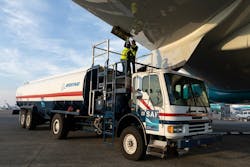A sudden rush to make sustainable aviation fuel mainstream
NEW YORK - A flurry of investments, policy changes and technological breakthroughs is giving a jolt of energy to the nascent market for sustainable aviation fuel, a low-carbon alternative to traditional jet fuel made from crude oil, David Gelles reports for the New York Times. Continue reading original article.
The Military & Aerospace Electronics take:
23 February 2023 - Airlines are committed to achieve net zero CO2 emissions by 2050 and see SAF as a key contributor. Current estimates expect SAF to account for 65% of the mitigation needed for this, requiring a production capacity of 450 billion liters annually in 2050.
Having agreed to a Long Term Aspirational Goal (LTAG) on climate at the 41st Assembly of the International Civil Aviation Organization (ICAO) in October 2022, governments now share the same target for aviation’s decarbonization and interest in the success of SAF.
Earlier this month, The Boeing Co. in Arlington, Va. has announced they will purchase 5.6 million gallons of blended sustainable aviation fuel (SAF) produced by Espoo, Finland-based Neste. The fuel will be used to support Boeing's domestic commercial operations through the calendar year. The 5.6 million gallons of SAF more than doubles Boeing's purchase in 2022.
Chicago's United Airlines announced earlier this month that it would be teaming with a pair of companies to produce and utilize the mixed fuel blend in an effort to reduce its carbon footprint.
Related: Boeing doubles its SAF purchase from 2022 to fuel commercial operations
Related: United Airlines' new partnership could power 50,000 flights with sustainable aviation fuel
Related: Sustainable Aviation Fuel production tripled in 2022: IATA
Jamie Whitney, Associate Editor
Military + Aerospace Electronics
